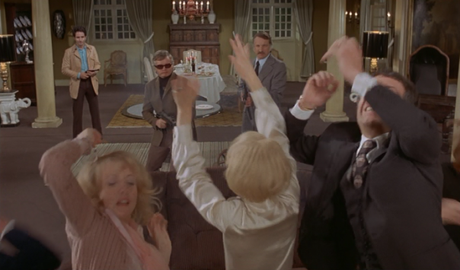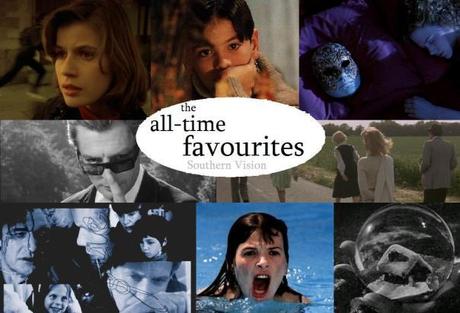
Welcome to the All-Time Favourites Series. This series examines 25 of the greatest films I’ve ever seen, looking at them in depth with analyses of what makes them great, and cutting down to the most basic level, looking at plot, cinematography, writing, direction, acting and other things, to see what makes these great films tick. This week’s film is Luis Buñuel’s greatest achievement, The Discreet Charm of the Bourgeoisie.
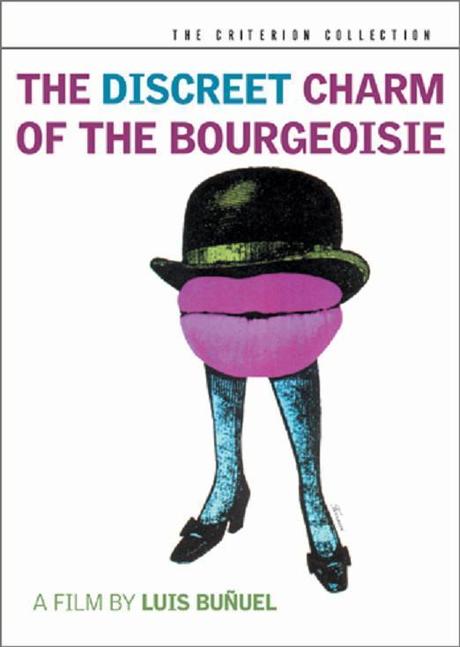
Luis Buñuel was one of cinema’s vicious attackers. He was ruthless, and scratched and screamed at class, religion, ideology and life in general. He despised the rules by which society lived. And he always carried with him everywhere a twisted but brilliant sense of humor. If Buñuel was not humorous, his movies would be painful, almost insufferable to watch. But no matter how dark and unforgiving he could be with his movies, he was always humorous. The Discreet Charm of the Bourgeoisie is one of cinema’s great black comedies.
In a list I wrote five months ago, I named Discreet Charm the best film of the seventies. Now, looking back at that list, there are a few changes I’d make but Discreet Charm would definitely remain #1. It is one of the ballsiest, most powerful, sadistic and pleasurable movies I’ve ever watched. To sink into it is to sink into Buñuel’s own private fantasy of torturing the middle/upper class in creative and surprising ways. Take for example the film’s entire premise, which is Buñuel refusing to allow a group of bourgeois businessmen and socialites the right to eat. Various obstacles get in their way: the wrong night, the death of the party host, and in one scene that often has viewers dumbstruck, the revelation that their dinner party is actually part of a staged theatrical performance.
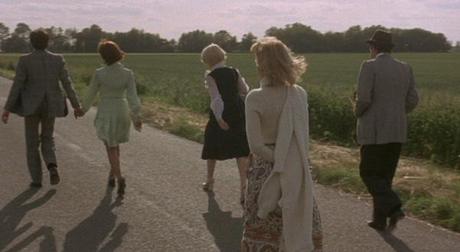
The bourgeois cannot be rude to their friends. A couple who are hosting a dinner party get a sudden urge to make love, but sneak off into the bushes to do so rather than just staying upstairs. However, when it comes to others, they are much less thoughtful. The very next scene shows a priest showing up at their doorstep wearing a gardening outfit. The respectable old man enjoys indulging in the pleasures of the garden, but the bourgeois couple are sickened by this. They refuse the old man entrance to their home. Seconds later, he shows up wearing his pastor’s uniform, and is welcomed warmly. The stupidity of the couple is enough to make viewers very, very angry, which is Buñuel’s intention.
Buñuel is a creative and clever man, and it is astounding to comprehend all the different subtle but brilliant methods of social embarrassment and discomfort he is unleashing. As the plot and characters fall apart, so does the structure of the movie. Characters wake up from dreams repeatedly; Buñuel takes strange detours into senseless vignettes, such as one involving a random soldier’s tragic childhood, and another involving a different soldier’s surreal dream. Buñuel is happy – nay, delighted – to let his movie take these strange detours. Its form is unlike that of any other movie. One emerges from the film disoriented, perhaps even somewhat nauseated, as a result of all the different mania. It is a movie that unquestionably needs to be seen several times.
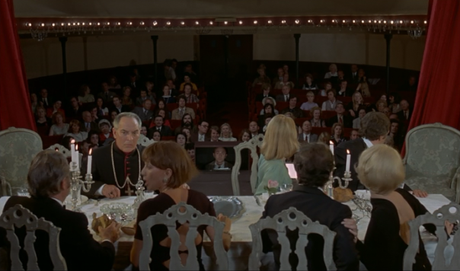
The film maintains a steady pace but seems to almost hurtle towards its dark conclusion, a momentous scene that remains my favorite in the film, and one which I won’t spoil. It is Buñuel ruthlessly discarding all that came before, and eliminating each character in a stunningly direct way which proves surprisingly to be a triumphant, if sadistic, release from madness. But Buñuel, the great satirist he was, made us question our satisfaction with this conclusion by having a character wake up from it. Oh, will this vicious cycle ever end? The film is tiresome, but I never grow tired of it. Another incredibly satisfactory but worryingly sadistic scene shows a priest abandoning his religion to pick up a shotgun and deliver sweet vengeance to a sick old man responsible for the death of his father. As satisfied as Buñuel and many viewers were with this, the scene is undeniably discomforting to watch, almost disturbing, and I wince every time that shotgun fires.
Shortly after his film garnered an Academy Award nomination for Best Foreign Language Film, Buñuel was questioned as to whether he thought it would receive the award. He replied, ever acerbically: “Of course it will! I already paid them the money they wanted. Americans may have their weaknesses, but they do keep their promises.” Buñuel was always as witty as ever about such things, and his sense of humor is what makes this film so watchable, so lovable and so completely batshit brilliant. Of course it won the Oscar.
